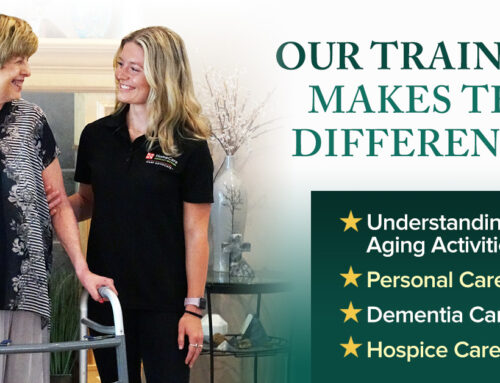Mom, Dad - We Need to Talk
Mom, Dad – We Need to Talk
Mom can no longer keep up with household chores – beds are unmade, there’s expired food in the fridge and unopened mail on the counter.
Dad spends less time with his friends and more time sitting in his recliner.
Is it time to suggest in-home care?
Aging parents
“It’s never easy to admit that you need help with day-to-day activities — especially for seniors, because they worry it’s the first step toward losing their independence,” said Sierra Goetz, operations manager at the HomeCare Advocacy Network (HCAN). “While care conversations can be very challenging, it’s important to have them before a crisis occurs.”
Family conversations
If you’re ready to have the tough talk with your parents, Goetz suggests you do the following:
Do your homework.
Speak with medical professionals or do some online research to gather the information you need to have productive discussions. Consider sharing relevant senior care articles to get the conversation started – “Mom, I just saw this article in AARP Magazine about in-home care. I’ve been thinking about it for a while now, and I want to make sure I know what’s important to you. What do you think about getting a little extra help.?”
Prepare for the conversation.
Develop an outline, so you won’t forget important points. Focus on the most important considerations for seniors – safety, freedom, peace of mind and social connection.
Include other family members.
Before talking to your parents, make sure you’re on the same page as your siblings – get their perspective and find out how much they’re able to help. If there are differences of opinion, work them out before having the conversation with your parents.
Have the conversation as early as possible.
Don’t wait for a health scare, car accident or other crisis to force the discussion because, at that point, your options may be limited.
If possible, talk in person.
It’s best to hold sensitive conversations in person. If you live too far away for that, consider setting up a video call, so you’ll be able to see each other as you talk. Choose a time when you’re both rested and relaxed and a place where you can’t be interrupted.
Make it clear that their well-being is your priority.
They need to know that you’re initiating the conversation, because you’re concerned about their health and safety… not with making your life easier.
Listen carefully and respect their feelings.
Unless they’re in danger, your loved one should have a choice in the matter. Be sure to listen their concerns, objections and anxieties without minimizing their feelings, and let them be part of the decision-making process.
Be patient.
It’s difficult to have a productive conversation if you’re impatient or frustrated. Accepting help can be a process, so be prepared to have a series of talks.
Caregiver support
“At HCAN, we work with families to develop customized care plans to meet their older loved ones’ unique needs,” Goetz said. “From companionship to personal care, our caregivers make sure they’re safe, healthy and comfortable with the care we’re delivering – whether it’s a few hours a week or around the clock.
To learn how we can help your loved ones age safely in their home, visit hcanthrive.com or call your local HCAN supported office.






